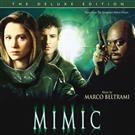|
|
||||
|
by Richard Jack Smith  Below are more soundtrack reviews of recent and archival releases. Above and Beyond (Hugo Friedhofer, 1952) ** Recognizing beauty, Above and Beyond certainly qualifies. However, its appeal rarely hints below the surface so the need to find out more becomes moot. Because Hugo Friedhofer ticks every box, his compositions emerge as safe. I wanted a little more risk, some out of the box thinking to balance the lazier interludes. Even at its most exciting, Above and Beyond proves artificially glamorous losing the dramatic heft that would make it indelible. As a standalone experience, the composer uses diversionary tactics yet he doesn’t count upon the trained ear to recognize such cliches. Dracula: Prince of Darkness (James Bernard, 1966) *** Composer James Bernard evokes subtle shadings for the original castle creep, those fangs from the void. The star status and fan phenomenon behind Hammer Films belongs to another universe. Meanwhile, Bernard adroitly dances between the lower registers and those shocking chords which signal imminent neck biting. He's careful about overplaying the hand which sends shivers down the spine. Mostly, his compositions assume a supporting role, allowing the imagination some chance at grasping the suspense. Empire of the Ants (Dana Kaproff, 1977) A poem: Lamentable at best Them! was kinder to the ants Farewell to the King (Basil Poledouris, 1989) **** Basil Poledouris bids farewell to his collaboration with director John Milius by means of a deeply resonant score. One could argue he’s in Dances with Wolves territory, courting romanticism via the sweep closely attributed to John Barry. However, there are some welcome anomalies. The woodwinds are first-rate recalling what we might hear in a forgotten culture. Promoting good will at every convenience, Farewell to the King enlightens through the soul of a profoundly gifted human being. Jane Eyre (Dario Marianelli, 2011) * Unless you are entering a midlife crisis or going through a breakup, Jane Eyre tends to roll by without definition. It's the perfect music to hear when feeling sad. I guess it's played well. However, the lack of variation taints any appreciation I might have for the technical aspects. The Post (John Williams, 2017) **** Themes and incidentals from The Post won’t break any new dams. Regarding style, two similar examples include John Williams' Saving Private Ryan and War of the Worlds. From sensitive piano to a climax of grit and determination, he delivers an excellent score. While the atmosphere can be solitary and pensive, those melodies work their prettiest persuasion. Perhaps I retreated into memories of David Shire’s All the President’s Men because I wasn’t expecting much emotional content. Yes, The Post can feel effortless to the degree that Williams was barely trying, yet such easy going craftsmanship combined with suspenseful measures (like his Nixon score) justify holding your breath. Actually, “The Presses Roll,” “Setting the Type” as well as “The Court’s Decision and End Credits” are convincing enough to seek the nearest retailer, part with a few coins and marvel over the contents. Return of the Fly (Paul Sawtell and Bert Shefter, 1959) **** Crucially, Return of the Fly yields far more sensitive themes and deliciously exaggerated passages than its predecessor. A romantic equilibrium, spiraling terms of discontent, doomsday foreshadowing and eerie world building cause transcendence. An unforeseen delight, low register trembling elevates “Gone Detective/The Phone Call.” Finally, this franchise got the engine it needed, and this thing runs like a beast. The Sword of the Barbarians (Franco Campanino, 1982) *** The Sword of the Barbarians carries an ancient cry into battle. In many ways, it’s music of lamentation. Otherwise, composer Franco Campanino skillfully employs woodwinds, choirs, brass and minimal electronics. His style involves capturing the mood of a given moment, and it comes full circle. It’s rarely heavy or overpowering for long, his ability to convey subtle variations in feeling a true asset. Regarding durability, I am hopeful that this first dip into Campanino’s music (for me at least) will yield even more startling returns. Woman of the Year (Franz Waxman, 1942) *** For a light diversion, I nominate Woman of the Year. The piano anchors a melody searching for its mate. Take comfort in the gentle tones nurtured by Franz Waxman, the boy wonder behind The Bride of Frankenstein. Meanwhile, "Breakfast Scene" offers woodwinds and a floating ambience. There's some mystery writing which plays well against the harmonious environment. Finally, the recording quality holds up remarkably well given the film's age. SCORE OF THE MOMENT Mimic (Marco Beltrami, 1997) ***** I get a genuine sense of disquiet from Mimic, Marco Beltrami’s riveting Gothic labyrinth. Spectacular woodwinds and brass, innovative aleatoric counterpoint as well as haunting choirs cement the legacy as cool. If there’s a dark side in me, it spins during such melodies of terror. Any composer can promote the jump scare or shallow shock absorber, yet it takes another breed to establish mystery and the purity of curiosity. That’s why characters wander off alone to investigate the dark. Music can share the suspense, putting our shoes in theirs. So, Beltrami treats the musical narrative like a detective scanning the crime scene, dissecting clues and daring to venture where evil tarries. |
||
|
© 2026 - ReelTalk Movie Reviews Website designed by Dot Pitch Studios, LLC |



